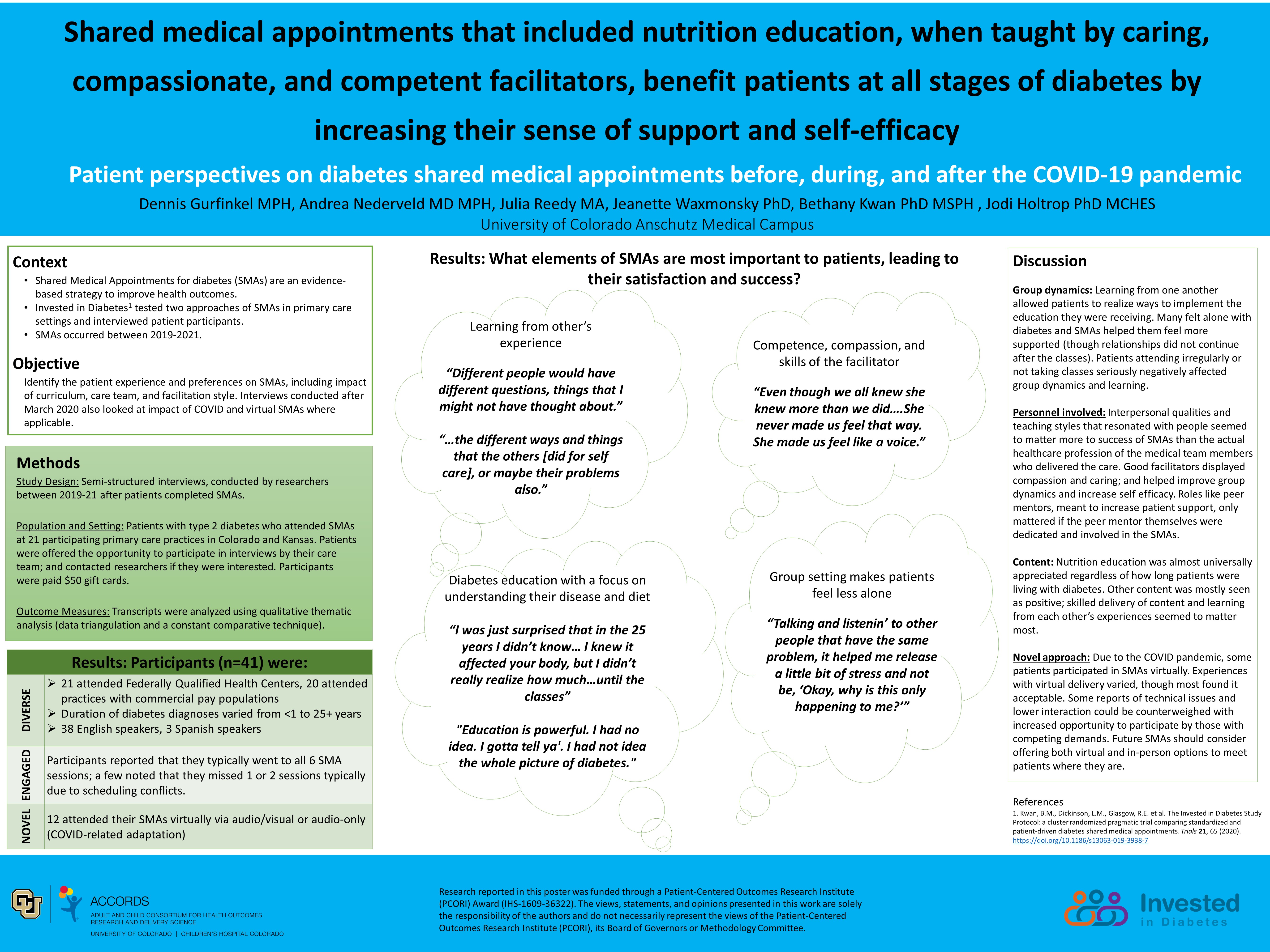PCR043: Patient perspectives on diabetes shared medical appointments before, during, and after the COVID-19 pandemic
Dennis Gurfinkel, MPH; Andrea Nederveld, MD, MPH; Julia Reedy, MA; Jeanette Waxmonsky, PhD; Bethany Kwan, PhD, MSPH; Jodi Summers Holtrop, PhD, MCHES
Abstract
Context: Shared Medical Appointments for diabetes (SMAs) are an evidence-based strategy improve health outcomes. However, which elements of SMAs are important remain unknown. Invested in Diabetes studied two implementation approaches (standardized [STD] vs. patient-driven [PTD]), using a curriculum focused on mental health and skill building in addition to diabetes self-management.
Objective: To understand patient experiences and preferences, including care team and peer mentor involvement, and how teaching style affected satisfaction. Those completing SMAs after the COVID pandemic began discussed their experience with virtual SMAs.
Study Design: Semi-structured interviews, conducted between 2019-21.
Setting: 21 primary care practices in Colorado and Kansas.
Population: Patients with type 2 diabetes who attended SMAs at participating sites.
Outcome Measures: Transcripts were analyzed using qualitative thematic analysis (data triangulation and a constant comparative technique).
Results: Forty-one patients from 14 participating clinics agreed to participate (25 STD, 16 PTD). All patients completed their 6-class cohort. Both newly diagnosed patients and those living with diabetes for longer found classes useful. Patients generally enjoyed the content, with nutrition favored most. Opinion on mental health topics and skill building varied, but overall deemed valuable. The social aspect of SMAs was seen as the biggest benefit. However, the peer mentor role (PTD only) was not always appreciated. Patient topic order selection and behavioral health as part of the care team (PTD only) were viewed as helpful but not necessary, though guest lecturers were supported by all. Facilitators were mostly seen as supportive and their teaching style agreeable, which contributed considerably to positive experiences. Those who did virtual SMAs had mostly positive views. The format allowed continuation of care that may have been halted due to the pandemic, let people with busy schedules to participate, and in some instances made sharing easier to do. Some would still have preferred an in-person class.
Conclusions: Patients found SMAs beneficial, favoring classic diabetes self-management topics over mental health and skill building. The peer mentor role was not always well received, likely due to variations in the peer mentor. Teaching style was very important to satisfaction, and all patients wanted guest speakers with varied expertise. A virtual format was acceptable.
Objective: To understand patient experiences and preferences, including care team and peer mentor involvement, and how teaching style affected satisfaction. Those completing SMAs after the COVID pandemic began discussed their experience with virtual SMAs.
Study Design: Semi-structured interviews, conducted between 2019-21.
Setting: 21 primary care practices in Colorado and Kansas.
Population: Patients with type 2 diabetes who attended SMAs at participating sites.
Outcome Measures: Transcripts were analyzed using qualitative thematic analysis (data triangulation and a constant comparative technique).
Results: Forty-one patients from 14 participating clinics agreed to participate (25 STD, 16 PTD). All patients completed their 6-class cohort. Both newly diagnosed patients and those living with diabetes for longer found classes useful. Patients generally enjoyed the content, with nutrition favored most. Opinion on mental health topics and skill building varied, but overall deemed valuable. The social aspect of SMAs was seen as the biggest benefit. However, the peer mentor role (PTD only) was not always appreciated. Patient topic order selection and behavioral health as part of the care team (PTD only) were viewed as helpful but not necessary, though guest lecturers were supported by all. Facilitators were mostly seen as supportive and their teaching style agreeable, which contributed considerably to positive experiences. Those who did virtual SMAs had mostly positive views. The format allowed continuation of care that may have been halted due to the pandemic, let people with busy schedules to participate, and in some instances made sharing easier to do. Some would still have preferred an in-person class.
Conclusions: Patients found SMAs beneficial, favoring classic diabetes self-management topics over mental health and skill building. The peer mentor role was not always well received, likely due to variations in the peer mentor. Teaching style was very important to satisfaction, and all patients wanted guest speakers with varied expertise. A virtual format was acceptable.

Jack Westfall
jwestfall@aafp.org 11/20/2021This is a great topic and research study. Nice work. Thanks